Items
Tag is exactly
government
-
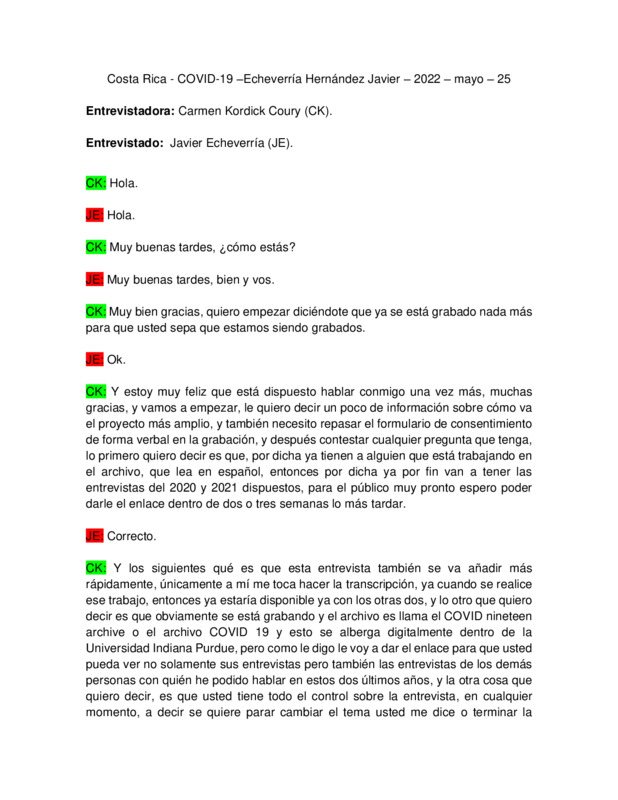 05/25/2022
05/25/2022Javier Echeverria Hernández Oral History, 2022/05/25
En esta entrevista Javier Hernández Echeverria es entrevistado por Carmen Kordick Coury concerniente al covid-19 en Costa Rica. Para empezar, hablan de los cambios que habían pasado desde el año anterior. Hablan de la situación en cuenta la pandemia y el programa de la vacunación. Hablan de la gente que aun no se han vacunado por falta de querer. Habla del camino a la normalidad, el uso de mascarillas, del gobierno, y nuevos candidatos. De allí hablan de su vida social, y el concierto de Cold Play. De La Caja, las elecciones, y el seguro social. Otra ves vuelven al tema de las vacunas, de gente que no se quiere vacunarse, de la familia de Javier y las noticias falsas. Habla sobre su vida ya jubilado, de la economía y inflación y gente sin trabajo. Para terminar, hablan de fuentes de información, de las elecciones y el nuevo gobierno. Al final habla del futuro. -
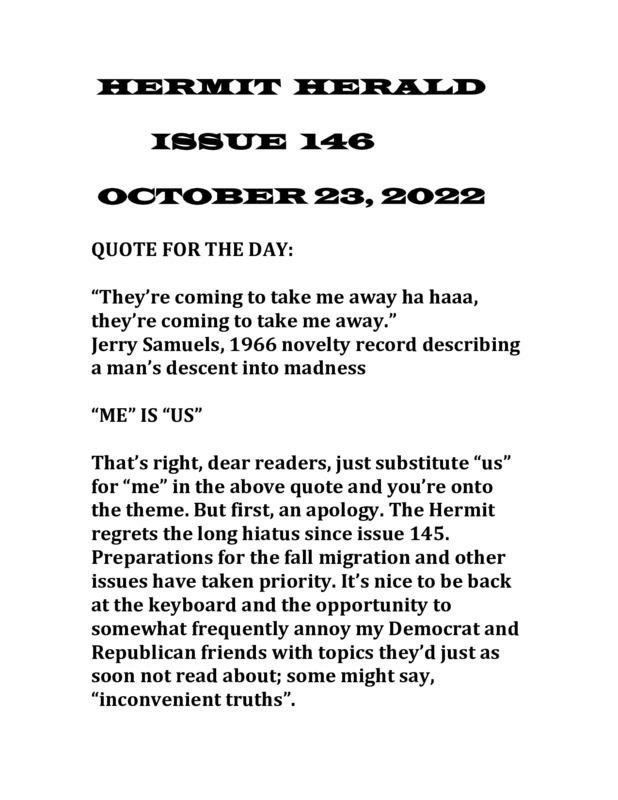 2022-10-23
2022-10-23HERMIT HERALD, ISSUE 146
DEMOCRACY AT RISK -
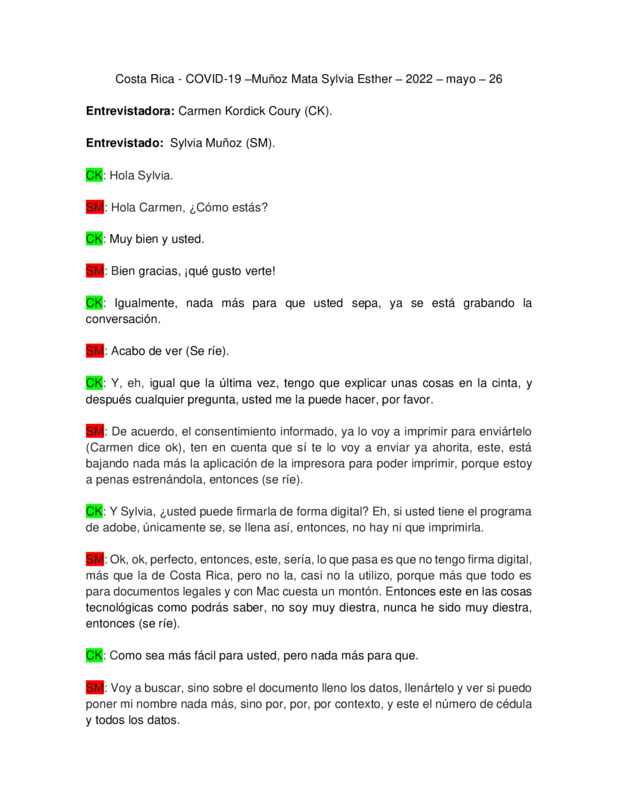 05/26/2022
05/26/2022Silvia Muñoz Mata Oral History, 2022/05/26
En esta entrevista Silvia Muñoz Mata es entrevistada por Carmen Kordick Coury concerniente al covid-19 en Costa Rica. Para empezar, Silvia habla de las cosas que habían cambiado desde el año anterior. Habla de su hogar y como se sintió cuando se enfermó. De la vacuna, teorías conspirativas, y del gene antivacunas incluyendo su novio. De allí, Silvia habla de su trabajo, de la salud mental, el abuso y violencia doméstica. Hablan de cuestiones sociales y el tema de la economía, gente sin trabajo y inflación. Pasan el tema de la inflación, la política, las elecciones y los candidatos. También hablan del gobierno, pensiones de lujo, hospitales y salud y el uso de las mascarillas. Para terminar, hablan de las fuentes principales de información y del futuro. -
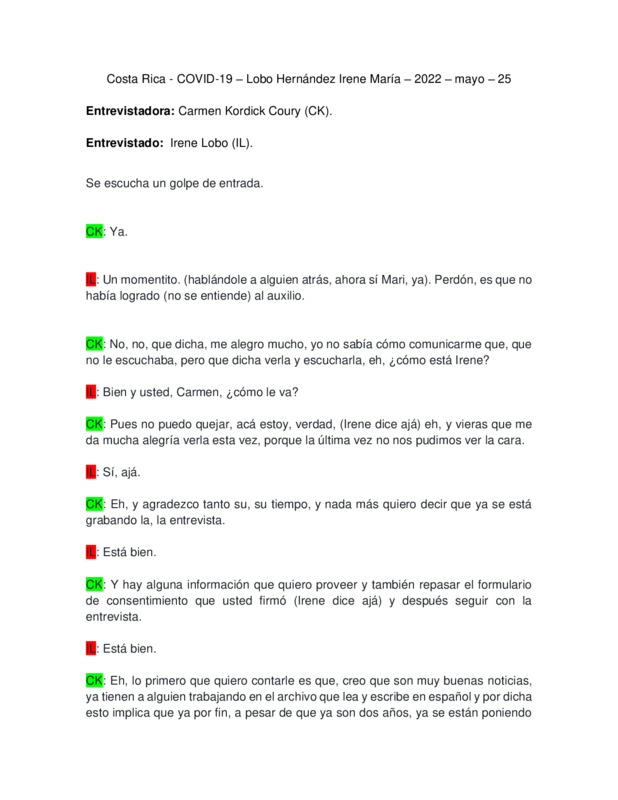 05/25/2022
05/25/2022Irene Lobo Hernández Oral History, 2022/05/25
En esta entrevista Irene Lobo Hernández es entrevistada por Carmen Kordick Coury concerniente al covid-19 en Costa Rica. Para empezar, hablan de lo que ha cambiado desde el ano anterior. Habla de su trabajo de abogada, del desempleo y la economía. Irene también habla del gobierno, de las vacunas y de gente que no confía en las vacunas. Habla de las elecciones y los candidatos. De gente conocida que se han enfermaron y unos que han fallecido por la pandemia. Irene también habla de las formas de celebrar la vida de su hermana que falleció el año anterior, habla de su familia y el uso de las mascarillas. Para terminar, habla de sus fuentes principales de información, la información falsa y sus deseos para el futuro. -
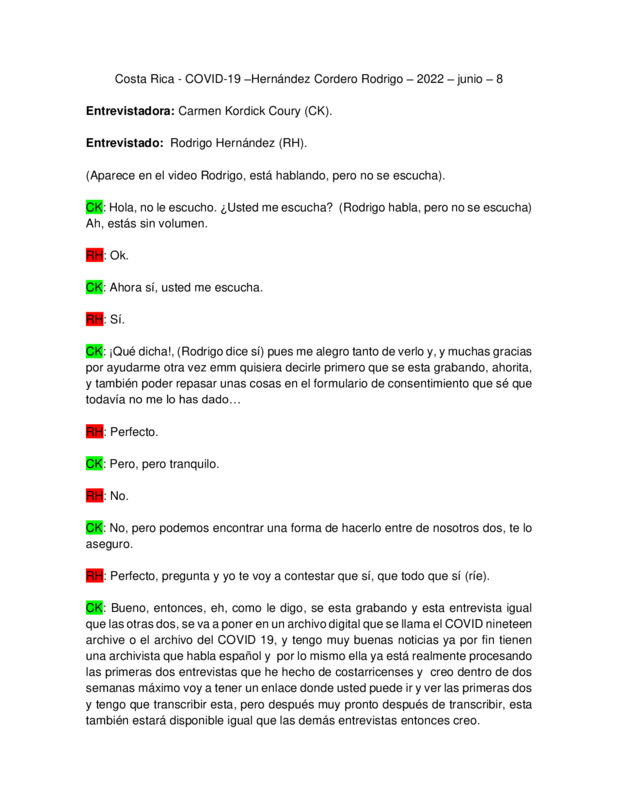 06/08/2022
06/08/2022Rodrigo Hernández Cordero Oral History, 2022/06/08
En esta entrevista Rodrigo Hernández Cordero es entrevistada por Carmen Kordick Coury concerniente al covid-19 en Costa Rica. Para empezar, hablaron de cosas que han cambiado desde el ano anterior. Hablaron de su negocio, inflación, y el gobierno. De allí hablaron del gobierno, la vacuna, y la mascarilla. Hablaron de La Caja, su vida social, y su familia. De las elecciones, fuentes principales de noticias y estudios cerebrales. Para terminar, hablaron de la juventud y de sus pensamientos del futuro. -
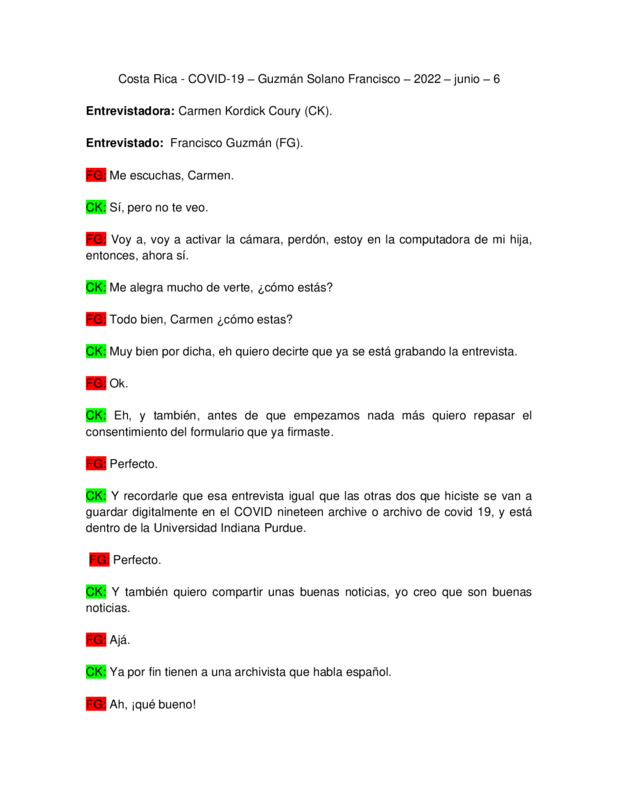 06/06/2022
06/06/2022Francisco Guzman Solano Oral History, 2022/06/06
En esta entrevista Francisco Guzman Solano es entrevistada por Carmen Kordick Coury concerniente al covid-19 en Costa Rica. Empiezan con los cambios que había pasado desde el ano anterior. Francisco habla de su familia y vida social. Hablan del uso de las máscaras, vacunas y la información falsa. De allí, hablan de la economía y la inflación, del gobierno y las elecciones. Hablan del crimen y las drogas. Para terminar, hablan de las fuentes principales de noticias y el futuro. -
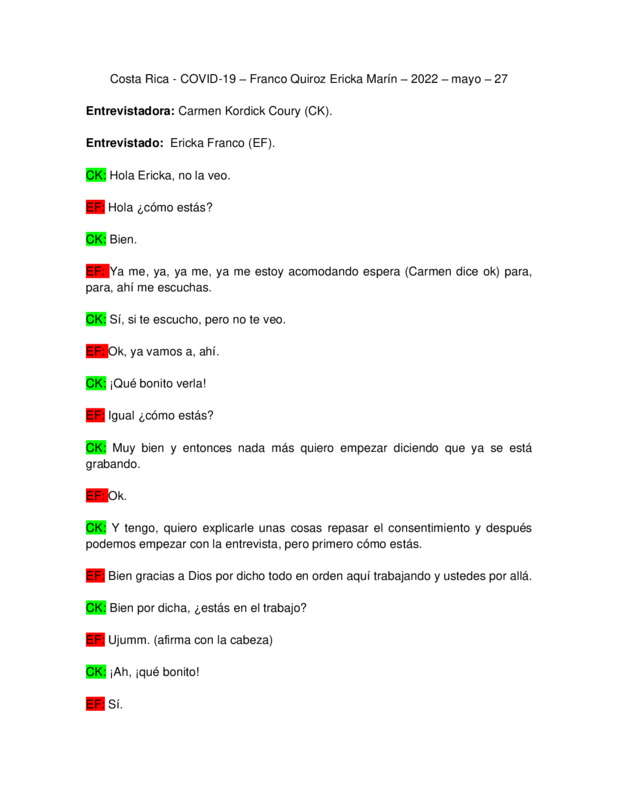 05/27/2022
05/27/2022Erika Franco Quirós Oral History, 2022/05/27
En esta entrevista Erika Franco Quirós es entrevistada por Carmen Kordick Coury concerniente al covid-19 en Costa Rica. Hablan de los cambios que habían pasado desde el año anterior y cuenta que ella empezó ir al trabajo presencialmente tiempo completo. Habla de las vacunas y mascarillas. Erika habla de su trabajo como orientadora para un colegio técnico profesional y también habla de los estudiantes. De allí, ella habla del gobierno, cuenta que ella contracto COVID, y habla de la gente que no se quiere vacunar. Habla de su vida social, fuentes de información donde ella se educa, y la economía. Para terminar, ella habla de las elecciones, salud mental y el futuro. -
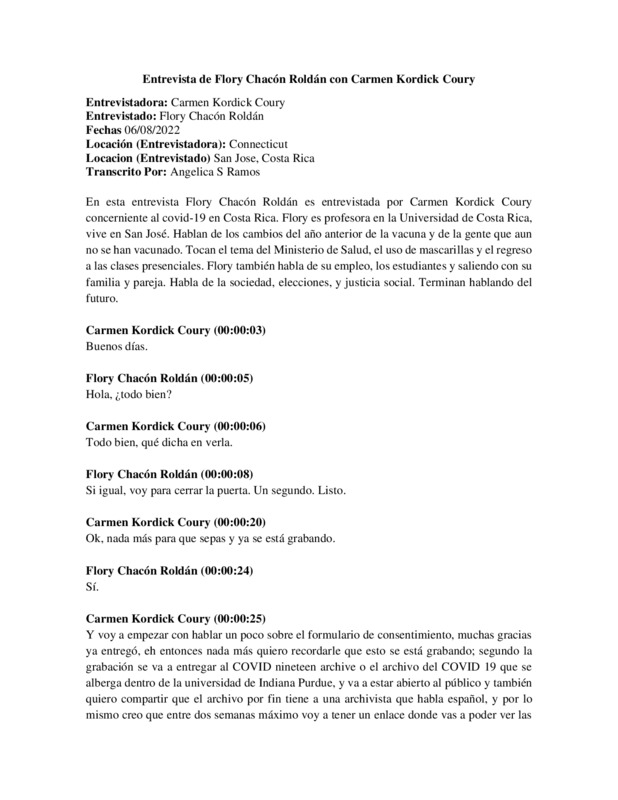 06/08/2022
06/08/2022Flory Chacón Roldán Oral History, 2022/06/08
En esta entrevista Flory Chacón Roldán es entrevistada por Carmen Kordick Coury concerniente al covid-19 en Costa Rica. Flory es profesora en la Universidad de Costa Rica, vive en San José. Hablan de los cambios del año anterior de la vacuna y de la gente que aun no se han vacunado. Tocan el tema del Ministerio de Salud, el uso de mascarillas y el regreso a las clases presenciales. Flory también habla de su empleo, los estudiantes y saliendo con su familia y pareja. Habla de la sociedad, elecciones, y justicia social. Terminan hablando del futuro. -
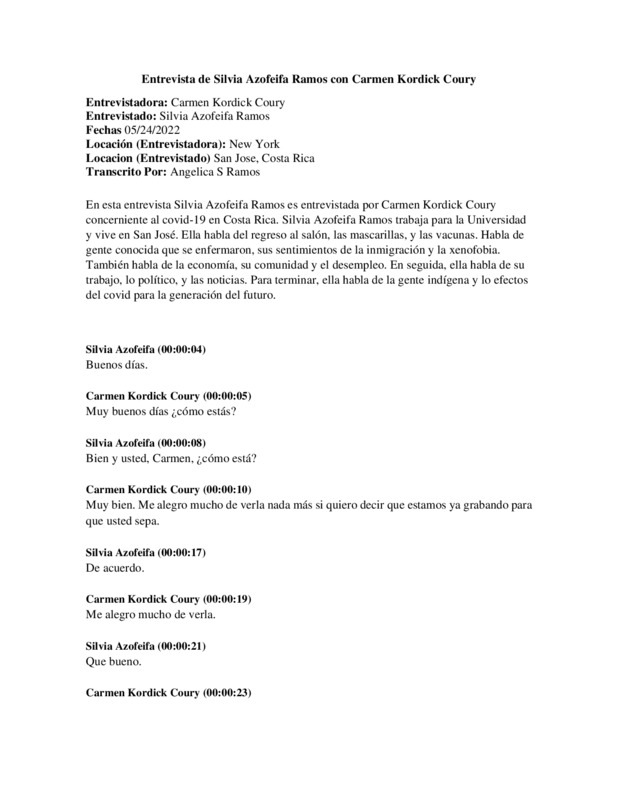 05/24/2022
05/24/2022Silvia Azofeifa Ramos Oral History, 2022/05/24
En esta entrevista Silvia Azofeifa Ramos es entrevistada por Carmen Kordick Coury concerniente al covid-19 en Costa Rica. Silvia Azofeifa Ramos trabaja para la Universidad y vive en San José. Ella habla del regreso al salón, las mascarillas, y las vacunas. Habla de gente conocida que se enfermaron, sus sentimientos de la inmigración y la xenofobia. También habla de la economía, su comunidad y el desempleo. En seguida, ella habla de su trabajo, lo político, y las noticias. Para terminar, ella habla de la gente indígena y lo efectos del covid para la generación del futuro. -
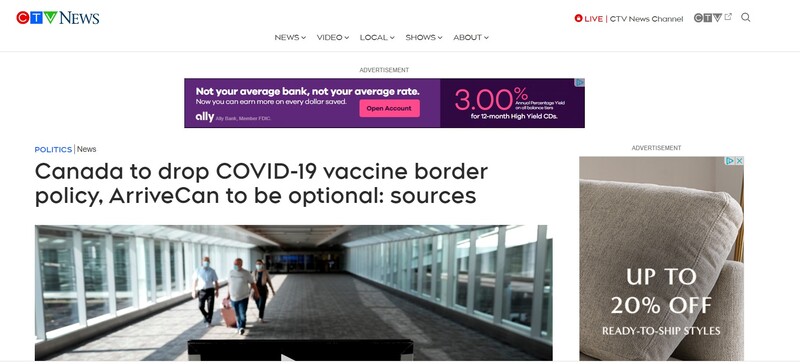 2022-09-21
2022-09-21ArriveCan application and Canada's COVID-19 vaccine border requirements
This news article reports Canada's plan to drop its COVID-19 vaccine border requirements, make the ArriveCan application optional, and possibly end COVID-19 testing for travelers by the end of September 2022. This news shows how the COVID-19 pandemic impacted travel and border relations between countries (Canada and US). -
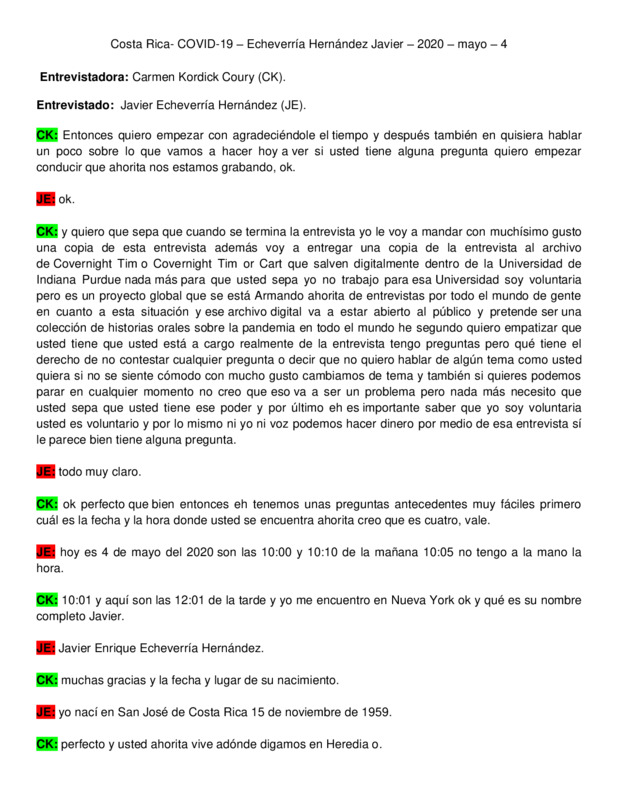 05/04/2020
05/04/2020Javier Echeverria Hernández Oral History, 2020/05/04
En esta entrevista Javier Hernández Echeverria es entrevistado por Carmen Kordick Coury concerniente al covid-19 en Costa Rica. Para empezar, hablan de la primera ves que Javier se dio cuenta de la pandemia, de cómo se sintió y sus preocupaciones. Habla de su hogar y las formas en que su vida ha cambiado, también habla de su trabajo de ingeniero agrónomo. De allí, hablan de la economía, de su familia y comunidad. Hablan del gobierno, cambios en su barrio y el uso de las mascarillas. También hablan de gente conocida que se han enfermado, gente que aun viajan y las fronteras cerradas. Para terminar, hablan de las fuentes principales desinformación, corrupción del gobierno y cambios en como ve su familia sus amigos y su comunidad. -
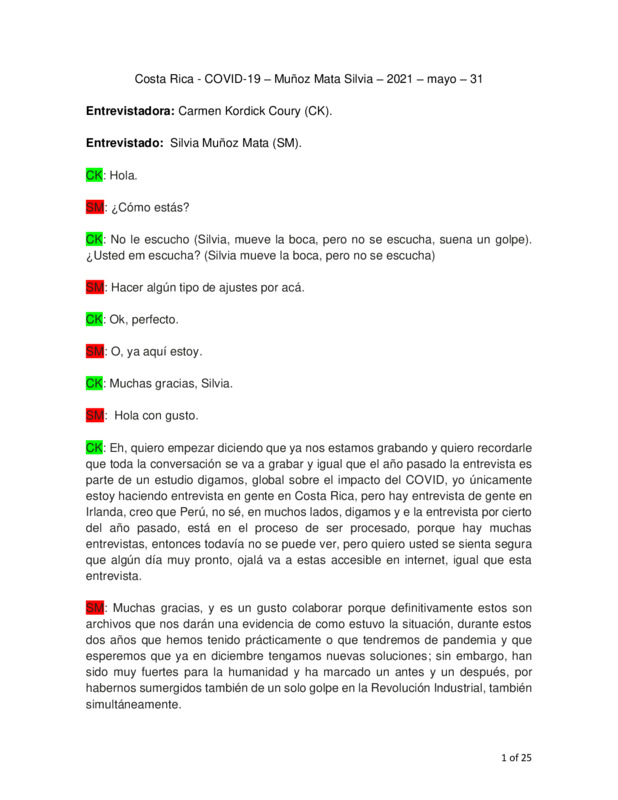 05/31/2021
05/31/2021Silvia Muñoz Mata Oral History, 2021/05/31
En esta entrevista Silvia Muñoz Mata es entrevistada por Carmen Kordick Coury concerniente al covid-19 en Costa Rica. Empiezan hablando de los cambios que habían ocurrido desde el ano anterior. Hablan del trabajo y el trabajo virtual. De la violencia domestica y otros problemas que existen en la sociedad. De allí hablan del crimen, violencia y las divisiones económicas que existen alrededor de ella. Hablan de las vacunas, gente conocida que no se quiere vacunarse y las teorías conspiratorias que existen sobre las vacunas. De allí hablan del gobierno, familia y salud física y mental. Para terminar hablan de narcotraficantes y del futuro. -
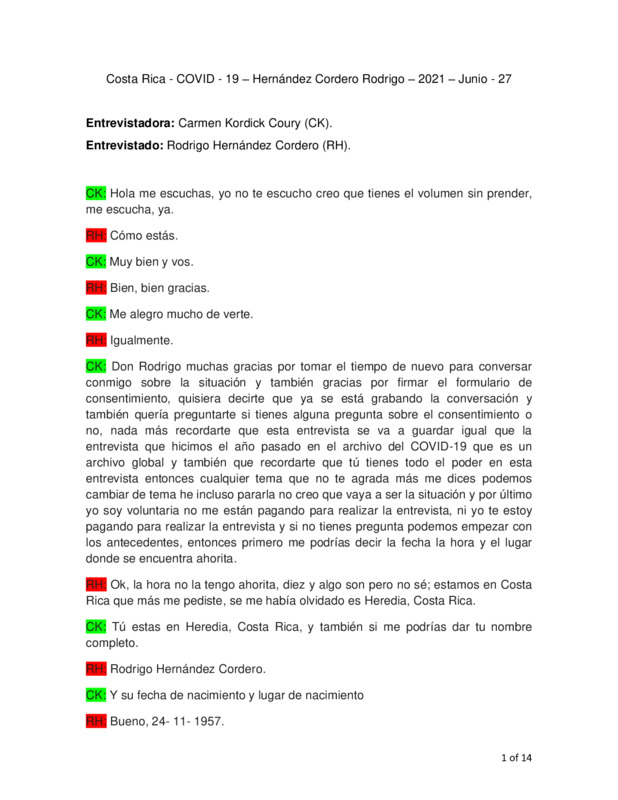 06/27/2021
06/27/2021Rodrigo Hernández Cordero Oral History, 2021/06/27
En esta entrevista Rodrigo Hernández Cordero es entrevistado por Carmen Kordick Coury concerniente al covid-19 en Costa Rica. Para empezar, hablaron de los cambios que pasaron desde el ano anterior. Rodrigo es dueño de tienda, hablan de su negocio, de las vacunas y de su deseo de no vacunarse. Hablan del gobierno, del uso de mascarillas y su familia. De allí, hablan de La Caja, el sistema médico y hospitales privados. Rodrigo habla de cruzando fronteras y comparando para su tienda. También de la corrupción del gobierno, vida familiar, salud mental y de los funerales. Para terminar, hablan de la esperanza para el futuro, fuentes principales de noticias y noticias falsas. -
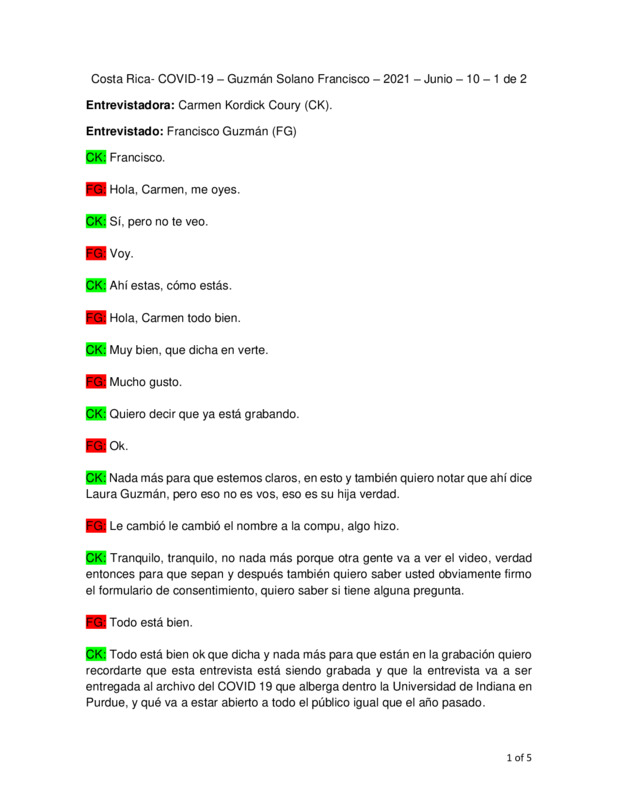 06/10/2021
06/10/2021Francisco Guzman Solano Oral History, 2021/06/21
En esta entrevista Francisco Guzman Solano es entrevistado por Carmen Kordick Coury concerniente al covid-19 en Costa Rica. Empiezan hablar de los cambios que Francisco ha visto desde el ano anterior. Hablan de la economía y el gobierno, de su trabajo y la vacuna. También hablan del aumento del crimen, de las drogas, y de las noticias falsas. De la Caja y el ministro de Salud. Francisco también habla de su familia y su hogar, de las fuentes principales de información y la sociedad. Terminan hablando de las clases virtuales de su hija, de la educación y del Ministerio de Educación. -
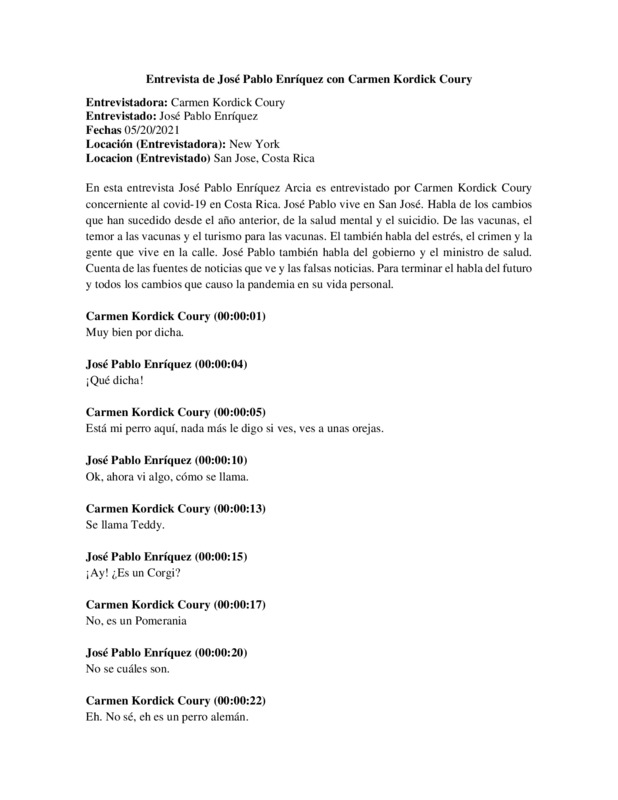 05/20/2021
05/20/2021José Pablo Enriquez Arcia Oral History, 2021/05/20
En esta entrevista José Pablo Enríquez Arcia es entrevistado por Carmen Kordick Coury concerniente al covid-19 en Costa Rica. José Pablo vive en San José. Habla de los cambios que han sucedido desde el año anterior, de la salud mental y el suicidio. De las vacunas, el temor a las vacunas y el turismo para las vacunas. El también habla del estrés, el crimen y la gente que vive en la calle. José Pablo también habla del gobierno y el ministro de salud. Cuenta de las fuentes de noticias que ve y las falsas noticias. Para terminar el habla del futuro y todos los cambios que causo la pandemia en su vida personal. -
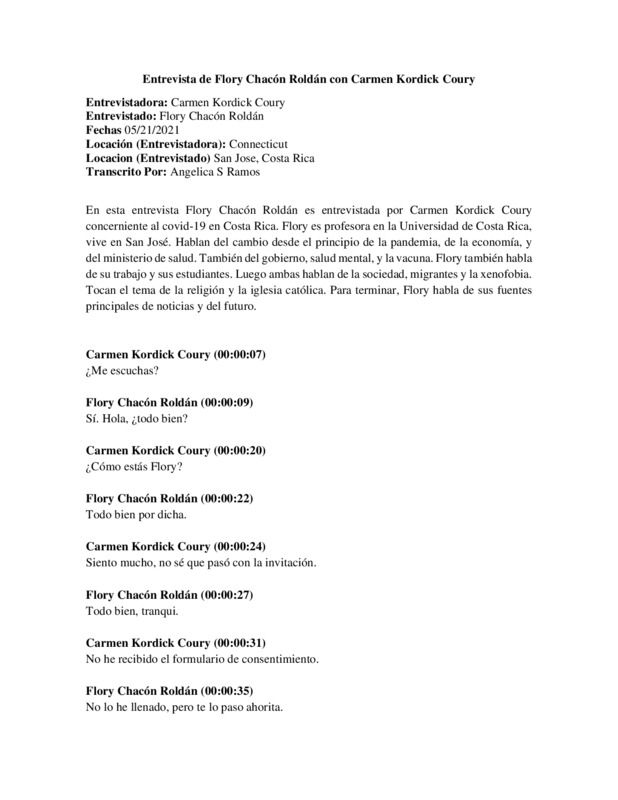 05/21/2021
05/21/2021Flory Chacón Roldán Oral History, 2021/05/21
En esta entrevista Flory Chacón Roldán es entrevistada por Carmen Kordick Coury concerniente al covid-19 en Costa Rica. Flory es profesora en la Universidad de Costa Rica, vive en San José. Hablan del cambio desde el principio de la pandemia, de la economía, y del ministerio de salud. También del gobierno, salud mental, y la vacuna. Flory también habla de su trabajo y sus estudiantes. Luego ambas hablan de la sociedad, migrantes y la xenofobia. Tocan el tema de la religión y la iglesia católica. Para terminar, Flory habla de sus fuentes principales de noticias y del futuro. -
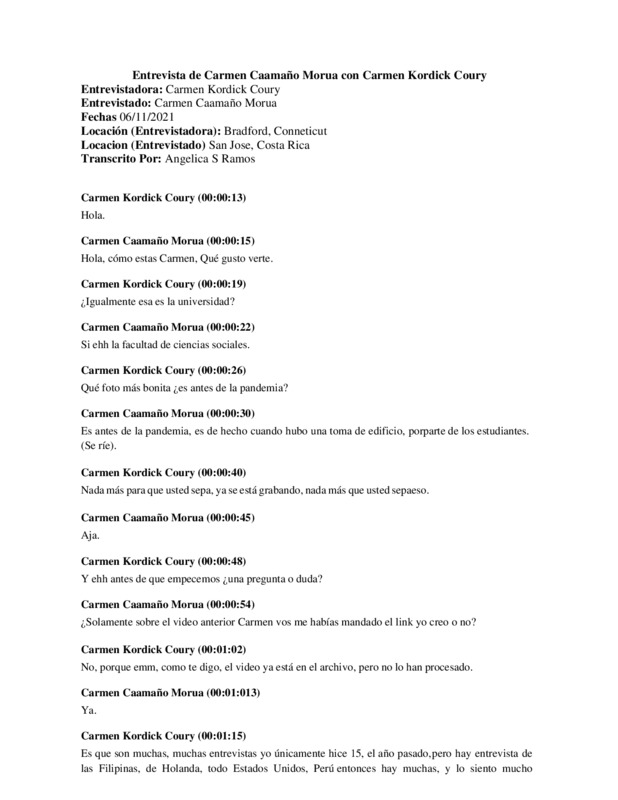 06/11/2021
06/11/2021Carmen Caamaño Morua Oral History, 2021/06/11
En esta entrevista Carmen Caamaño Morua es entrevistado por Carmen Kordick Coury concerniente al covid-19 en Costa Rica. Carmen es profesora en la Universidad de Costa Rica y vive en San José. Habla de su trabajo virtual en la universidad, del crisis de la salud mental y de la gente que cree en las teorías de la conspiración. Carmen habla de la relación entra las ciencias y la religión y como eso afecta los sentimientos hacia la vacuna. Habla de la xenofobia, el racismo y el clasismo. También habla de las vacunas y la respuesta del gobierno. Para terminar, Carmen habla del gobierno, la economía y las noticias. -
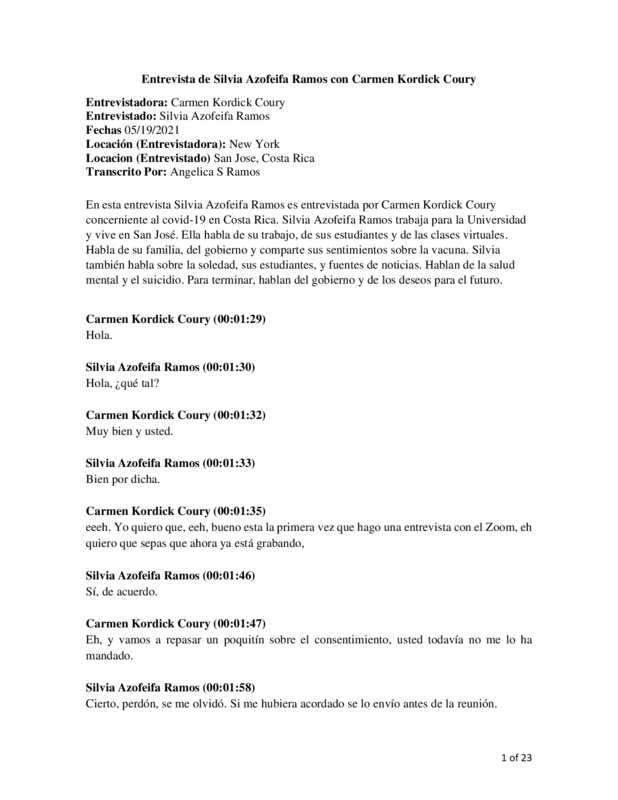 05/19/2021
05/19/2021Silvia Azofeifa Ramos Oral History, 2021/05/19
En esta entrevista Silvia Azofeifa Ramos es entrevistada por Carmen Kordick Coury concerniente al covid-19 en Costa Rica. Silvia Azofeifa Ramos trabaja para la Universidad y vive en San José. Ella habla de su trabajo, de sus estudiantes y de las clases virtuales. Habla de su familia, del gobierno y comparte sus sentimientos sobre la vacuna. Silvia también habla sobre la soledad, sus estudiantes, y fuentes de noticias. Hablan de la salud mental y el suicidio. Para terminar, hablan del gobierno y de los deseos para el futuro. -
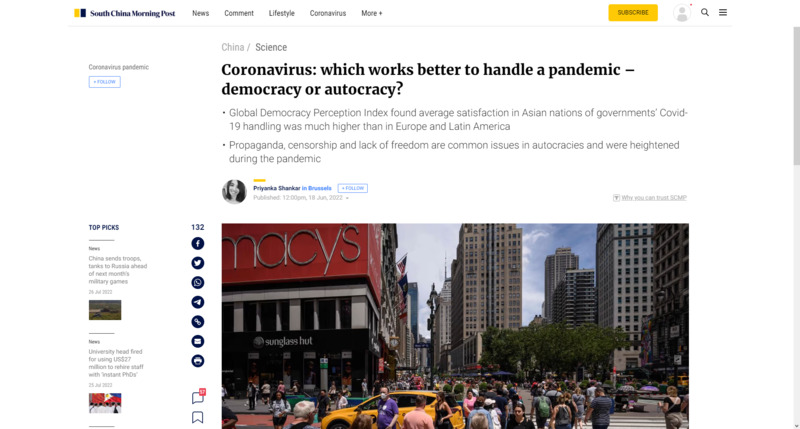 2022-06-18
2022-06-18Coronavirus: which works better to handle a pandemic – democracy or autocracy?
This is a news story from the South China Morning Post by Priyanka Shankar. This article is discussing the difference in responses based on forms of government. When it came to handling the pandemic, people from Asian countries where restrictions were much tougher rated a higher rate of satisfaction in government response compared to Latin America and Europe. This was taken from the Democracy Perception Index. According to researcher Fredrick DeVeaux, a leader in conducting this survey, the tight restrictions common in Asian countries are generally accepted because it gets associated with low death rates. The survey does make mention that in countries such as Iran and China, they hid data about the virus from their citizens, affecting their overall response to changes in lockdowns. However, Singapore is also authoritarian, and the prime minister has made an effort to create transparency in what is occurring, so items get hoarded less. Overall, the article claims that the mass mobilization of people and goods under authoritarian regimes fares better than democracies do at creating an effective COVID response. -
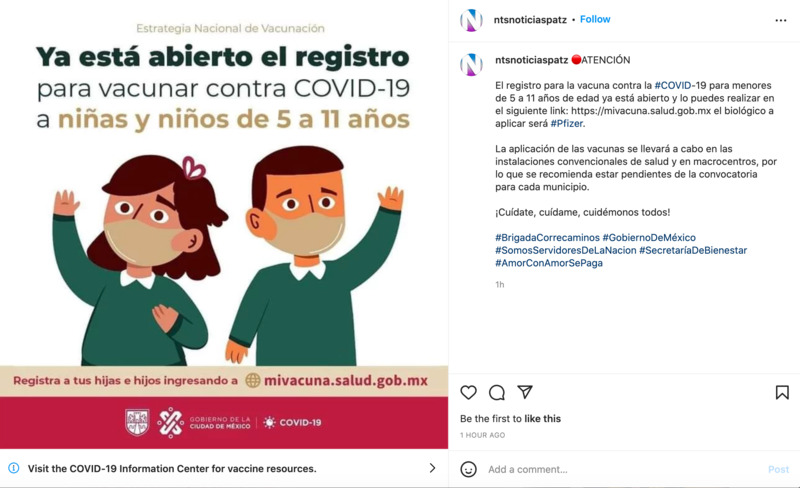 2022-06-17
2022-06-17Vaccines for kids 5-11
This is an Instagram post by ntsnoticiaspatz. It is saying that if you have not, you should register your kid to receive their vaccine. This is being promoted by the Mexican government. -
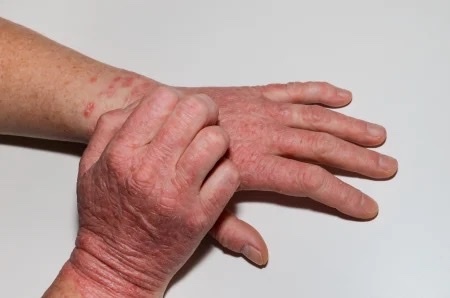 2022-05-25
2022-05-25My Hands Are Raw and I Can't Think
Listening to Marketplace on the radio each morning as I arrived at work in mid-January of 2020, I never suspected that what was forcing cancelations of Lunar New Year celebrations in China would leave me with raw hands and ringing ears. At that time, I was working at the Census Bureau for the lead person responsible for on-the-ground execution of the 2020 census in Idaho. The work involved data analysis and strategic planning, as we created and staffed a field operation to complement the Census Bureau’s attempt to transition from the traditional door-to-door canvassing to online self-reporting. In the early days of the pandemic, we tried to maintain business as usual as we, and most of the country, watched cases rise. When things got bad enough, a mandate from Washington shut down our office for nearly six weeks. When our team was called back, we entered a totally new world. The Census Bureau leadership had mandated a hyper safe work environment and work rules. The office furniture was completely rearranged to create social distance. A six-foot perimeter around every desk was marked on the floor to ensure work interactions took place at a distance. Similarly, walking paths were marked on the floor and one-way traffic was encouraged. Everyone was issued a box of masks and hand sanitizers and soap dispensers were everywhere. The visual was pretty laughable but it is my hands and ears that carry the strongest memories of attempting to work in this environment. Trying to comply with the guidelines meant more hand washing and sanitizing than one would likely see around an operating room. The government, while trying to be a really good parent, however, had failed to supply hand lotion. Shame on me! I didn’t bring my own and raw, chapped hands became my red badge of courage, and compliance. Additionally, I will never forget the volume in that concrete block room. A room full of people on the phone can be noisy; but social distanced work conversations meant masked people shouting to co-workers as they stood six feet from their desk. It was the definition of cacophony. The work I was doing required a lot of attention to detail and I remember it being so loud at times I could not think clearly. There were time I would go outside to listen to quiet of the traffic on the busy street in front of the office. -
 2022-04-20
2022-04-20"Trust the Science" is Anti-Science
This is an Instagram post by city_slicker_bnswagon. This person is questioning the way we think of the science surrounding COVID. This person thinks that the virus is more political than it is about health. -
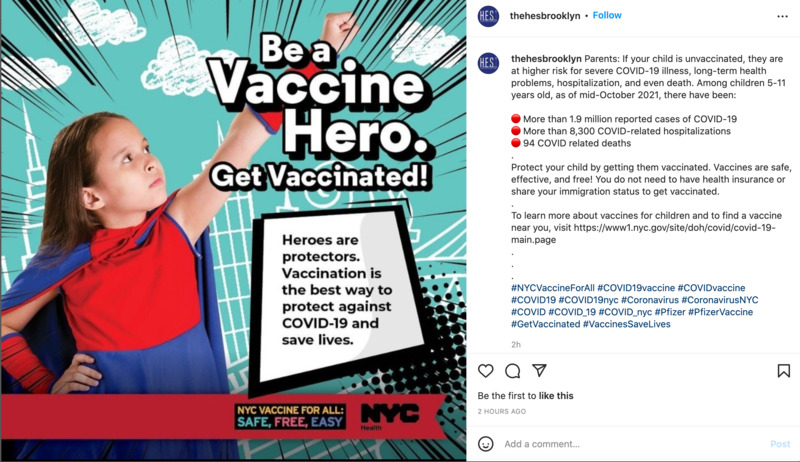 2022-04-07
2022-04-07Be a Vaccine Hero
This is an Instagram post by thehesbrooklyn. This is a post encouraging children to get vaccinated. This post has a link to the New York City government website on more information on COVID. The picture shows a little girl dressed as a super hero as part of the PSA. -
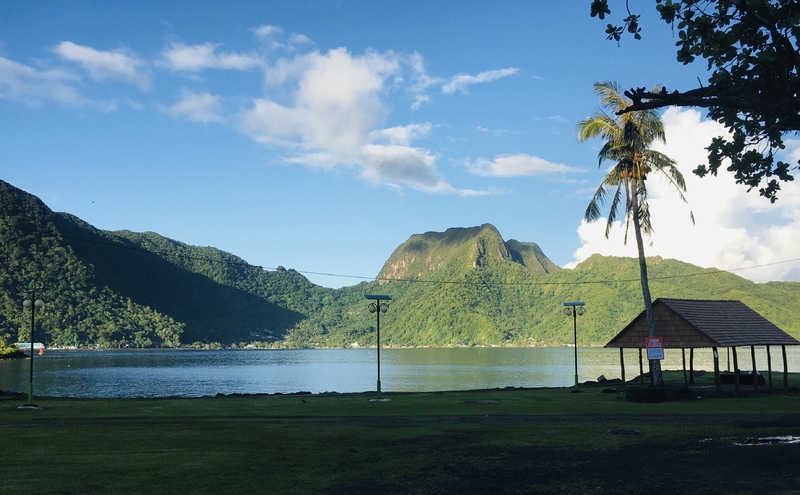 2022-04-05
2022-04-05Big Changes to a Small Island
At the "heart" of Polynesia, (referring to its geographic location in the Polynesian triangle) American Samoa appears as another tiny dot on the map. Nevertheless, it means the WORLD to its 55,000+ people, and to some, it is all they have ever known as their home. It is also the southernmost territory of the United States (below the Equator) and the second to the last place on earth to always welcome the New Year LAST. Perhaps it coincidently depicts the slow-paced nature of the island to which many visitors claim that "it feels like time slows down", here at a piece of heaven on earth that is deeply rooted in the Christian faith and the "Fa'aSamoa", a.k.a the Samoan culture or literally, the "Samoan way of life". The people of our island are like a big tight-knitted family--we are all related anyway--when something good or bad happens on the west side of the island, news travels to the east faster or about the same as the speed of light! It has its disadvantages, but for the most part, it is a beautiful thing to see the collective reaction of our people when it is of happiness, support, and sympathy. When the coronavirus started spreading rapidly in the United States in early 2020, our territory continued its commercial flights until mid-March when Hawaii's cases started to rise. Since March 2020, our borders were closed to commercial travel for the next 11 months, not including cargo flights and ships. Residents were stuck in the States for nearly a year. The first of many repatriation flights finally began in February 2021. The repatriation flights took place once a month, during which passengers would undergo a strict process of testing and reporting, a quarantined stay in Hawaii for 12 days, and another 2-weeks quarantine upon arrival in American Samoa. Throughout all repatriation and medical flights, the quarantine process was still a requirement, which was how positive cases were caught and taken care of to prevent community spread. Fast forward to February 2022, exactly a year later, news of a COVID outbreak quickly spread when it was leaked on social media that the family of a Department of Health worker tested positive for COVID at the main hospital. The general public was seeking answers and taking their concerns on social media until later on that same evening the said family tested positive, the local news channel held a Livestream in which the Governor, Lieutenant Governor, and the COVID-19 Task Force officially announced the community outbreak of the virus. People rushed to the stores to buy necessities and food before the lockdown was set to begin at midnight. The lockdown was marked as Code Red, with curfews from 9pm to 4:30 am, and business hours to be from 8am to 4pm, while all government workers and non-essential employees are to stay home, except essential workers and first-responders. Students transitioned to virtual learning and now interact in class with options such as "raise hand" and/or "mute/unmute". Our people had to adjust very quickly to the new reality we now face. A small island once free with family gatherings, church services, and close human interaction as we are known for...now all of that sounds like a distant memory that will take some time to experience again. Beaches and parks used to be crowded with people and all the happiness they offer their surroundings, now empty and eerily quiet with a "CLOSED" sign nearby. We are masking up everywhere--with little to no physical interaction--so far with 4,700+ cumulative positive cases and a total loss of 7 souls, which has hit our dearest island with extreme sorrow. While the world has moved forward and learned to live with COVID, even opening back up and unmasking, our island is once again a little behind with the experience. It is only the beginning for us! Fortunately, our unwavering faith in God continues to be our ultimate Hope, along with the support of our loving families, beloved people, the United States, and our fellow Pacific islands. One thing we are sure of is that WE ARE RESILIENT PEOPLE, having overcome many challenges for centuries! This too shall pass...on the bright side, in order for it to pass, our journey with COVID had to begin. Now we must go through it, endure it, and overcome together AS one like we always do! God be with us...God IS with us. -
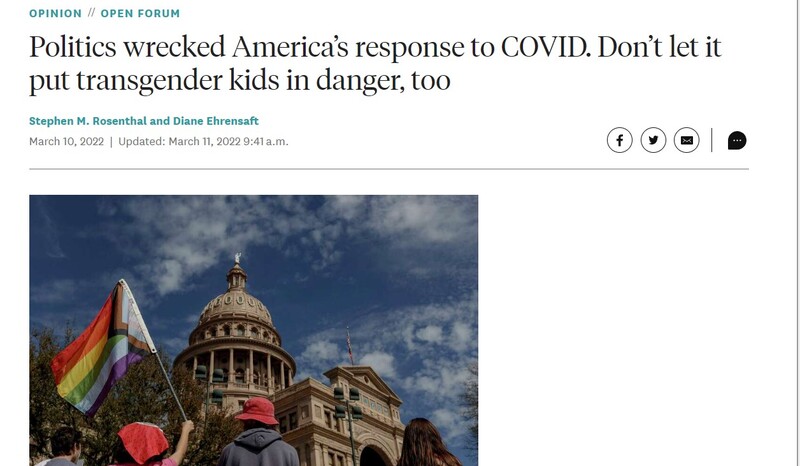 2022-03-10
2022-03-10Politics wrecked America’s response to COVID. Don’t let it put transgender kids in danger, too
This is a news story from The San Francisco Chronicle, written by Stephen M. Rosenthal and Diane Ehrensaft. This is an opinion piece comparing the government response to COVID and the politics surrounding it to ruining the response. The authors warn that following politics over science is dangerous. It later goes on to talk about the anti-trans legislation being passed through different states, such as: Idaho, Texas, and Florida. The authors believe that science proves that trans kids have no real threat from puberty blockers. A study is also quoted, where it says that gender affirming care for trans youth is linked to lower instances of depression. The point of this article is not so much about COVID itself, but fear of what was done during the peak of COVID being repeated on other types of legislation, and in this case, using politics over science with trans kids. -
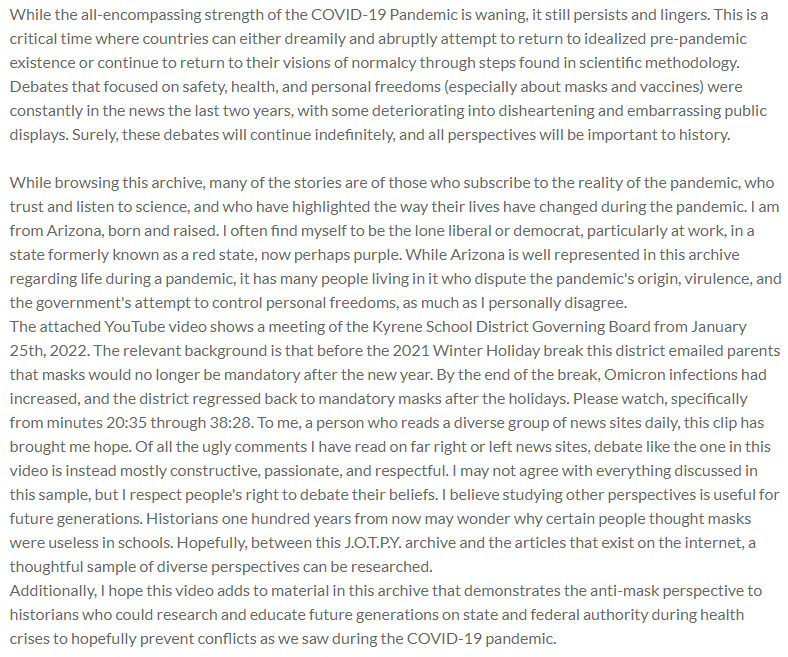 2022-03-15
2022-03-15Passionate and (mostly) respectful recent debate in the waning pandemic
While the all-encompassing strength of the COVID-19 Pandemic is waning, it still persists and lingers. This is a critical time where countries can either dreamily and abruptly attempt to return to idealized pre-pandemic existence or continue to return to their visions of normalcy through steps found in scientific methodology. Debates that focused on safety, health, and personal freedoms (especially about masks and vaccines) were constantly in the news the last two years, with some deteriorating into disheartening and embarrassing public displays. Surely, these debates will continue indefinitely, and all perspectives will be important to history. While browsing this archive, many of the stories are of those who subscribe to the reality of the pandemic, who trust and listen to science, and who have highlighted the way their lives have changed during the pandemic. I am from Arizona, born and raised. I often find myself to be the lone liberal or democrat, particularly at work, in a state formerly known as a red state, now perhaps purple. While Arizona is well represented in this archive regarding life during a pandemic, it has many people living in it who dispute the pandemic's origin, virulence, and the government's attempt to control personal freedoms, as much as I personally disagree. The attached YouTube video shows a meeting of the Kyrene School District Governing Board from January 25th, 2022. The relevant background is that before the 2021 Winter Holiday break this district emailed parents that masks would no longer be mandatory after the new year. By the end of the break, Omicron infections had increased, and the district regressed back to mandatory masks after the holidays. Please watch, specifically from minutes 20:35 through 38:28. To me, a person who reads a diverse group of news sites daily, this clip has brought me hope. Of all the ugly comments I have read on far right or left news sites, debate like the one in this video is instead mostly constructive, passionate, and respectful. I may not agree with everything discussed in this sample, but I respect people's right to debate their beliefs. I believe studying other perspectives is useful for future generations. Historians one hundred years from now may wonder why certain people thought masks were useless in schools. Hopefully, between this J.O.T.P.Y. archive and the articles that exist on the internet, a thoughtful sample of diverse perspectives can be researched. Additionally, I hope this video adds to material in this archive that demonstrates the anti-mask perspective to historians who could research and educate future generations on state and federal authority during health crises to hopefully prevent conflicts as we saw during the COVID-19 pandemic. This video is owned and uploaded by the Kyrene School District to YouTube. -
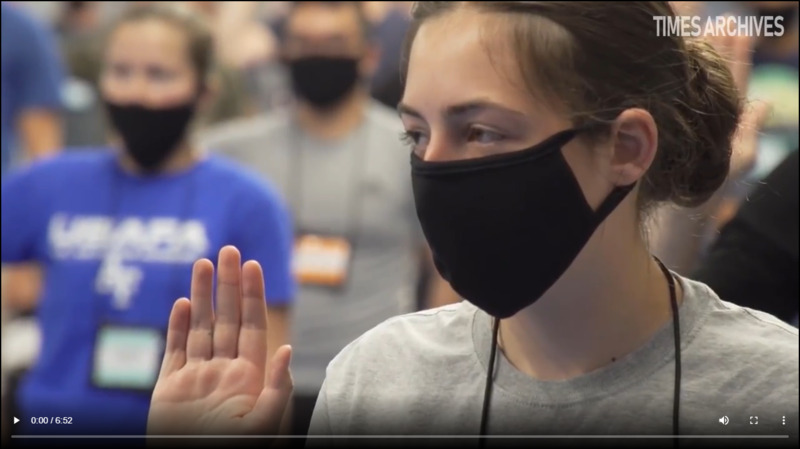 2020-06-25
2020-06-25In-Processing Day for the Class of 2024 at the United States Air Force Academy
Imagine yourself going into your senior year of college... but at a service academy while COVID-19 has sunken its teeth into every aspect of our lives. While most colleges and universities around the globe pushed back the start dates of their fall semesters in 2020 or moved entirely online, Service academies in the U.S. needed to meet congress' demand of supplying a steady stream of future commissioned lieutenants to the military. As a result, I found myself at 23 years old as a flight commander of 30 young, recent high school graduates who needed the same level of indoctrination I received into the Air Force four years prior. Rather than videos of years past with cadet cadre in the faces of soon-to-be freshmen screaming at the top of their lungs, this video provides the innocuous version of in-processing with unedited or dubbed audio. You might even see a few of my basics who didn't know what to expect of basic training during the pandemic. While the cadre in the film stand professionally and talk with a sense of authority towards the basics, I can tell you behind the scenes we were re-writing COVID-19 protocol and adjusting their syllabi as each day passed. Your authority as a military instructor weakens as its filtered through a wet, uncomfortable cloth mask (I strongly encourage you to look up "I-Day" videos of USAFA prior to the pandemic to compare). Can you imagine how much you have to yell through one of those masks to get 30 individuals to hear you over the other 39 flights sprinkled across the campus drill pads? My 6 weeks as a flight commander were filled with frustration, sympathy, reward, and most of all focus. First, focusing visually, I had to maintain social distancing anywhere from when basics were wrapped around the hallways to wait to shower all the way to when they practiced marching non-military standard "double-arm interval" for their basic training graduation day. Also, focusing through sound, I had to understand my basics through sweat or dirt covered masks as they recited knowledge, asked questions during academic blocks, or were struggling and needed follow-up mentoring. The measurable distance between trainers and trainees as well as the pauses of silence, normally filled with a constant cacophony of yelling, are what many graduates of my alma mater would call weak. Despite a lack of intensity, masks added a layer of confusion and frustration during a period that is already filled with fear, stress, and exhaustion for basics. For that reason, I want to ask those who weren't there to understand sensually why the class of 2024 still went through the same basic training experience as years past. Maybe a second listen to the audio can even reveal those same frustrations and fears from the basics reflected in the tone of their cadre. -
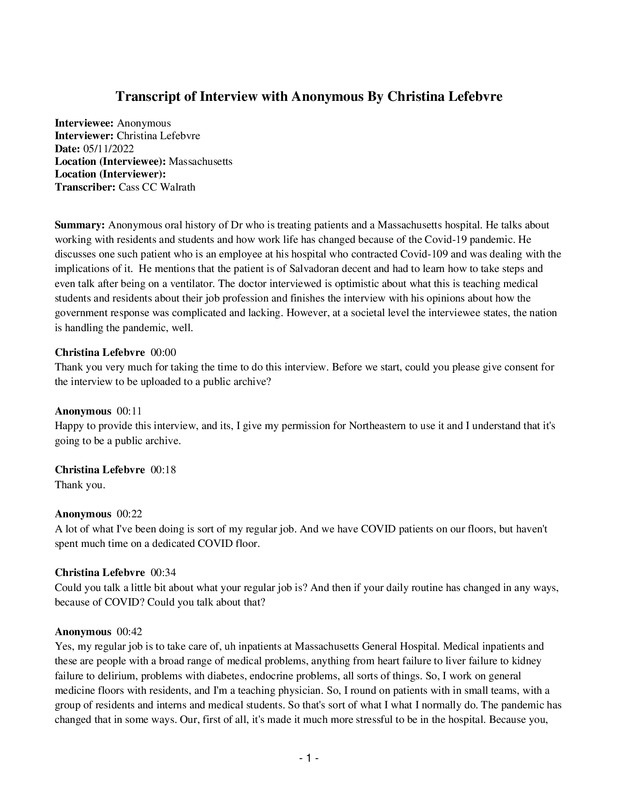 08/04/2020
08/04/2020Anonymous Oral History, 2020/08/04
Anonymous oral history of Dr who is treating patients and a Massachusetts hospital. He talks about working with residents and students and how work life has changed because of the Covid-19 pandemic. He discusses one such patient who is an employee at his hospital who contracted Covid-109 and was dealing with the implications of it. He mentions that the patient is of Salvadoran decent and had to learn how to take steps and even talk after being on a ventilator. The doctor interviewed is optimistic about what this is teaching medical students and residents about their job profession and finishes the interview with his opinions about how the government response was complicated and lacking. However, at a societal level the interviewee states, the nation is handling the pandemic, well. -
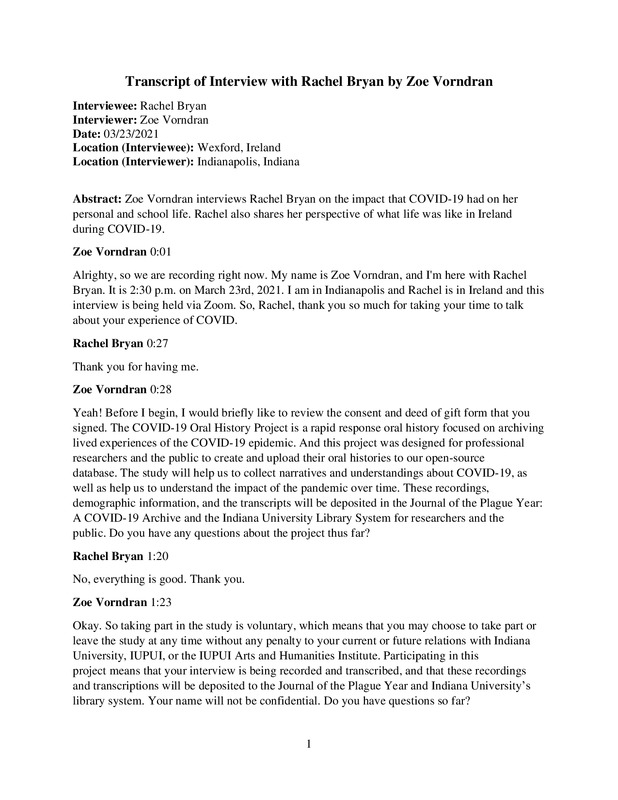 04/06/2021
04/06/2021Rachel Bryan Oral History, 2021/04/26
-
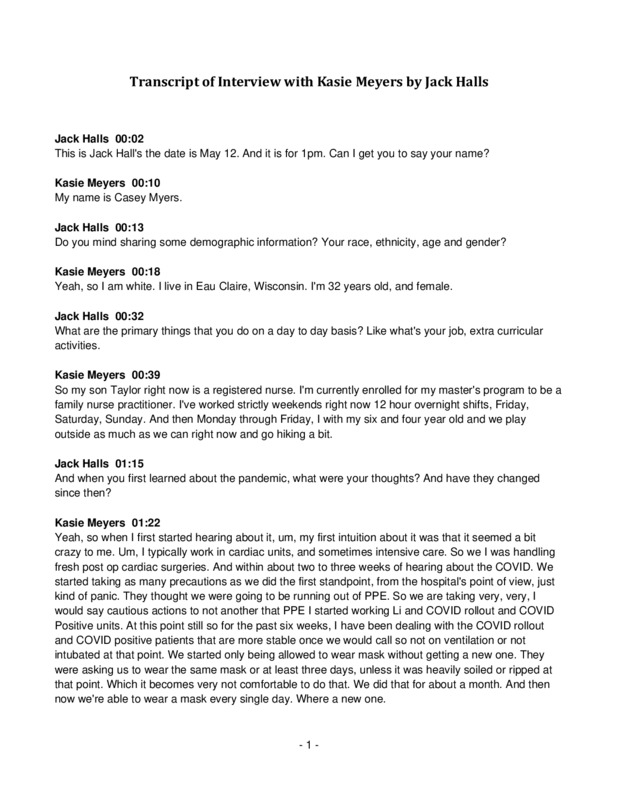 05/12/2020
05/12/2020Kasie Meyers Oral History, 2020/05/12
Interview with Kasie Meyers by Jack Halls. In this interview, Kasie Meyers discusses how COVID has impacted her role as a nurse and the changes she and her colleagues face. She also discusses her journey as a student and how covid has impacted her studies, she touches on her role as a mother and the difficulties that have been heightened because of the pandemic. She expresses how her relationships with friends and family have changed and also discusses her view on the government and its handling of the pandemic. -
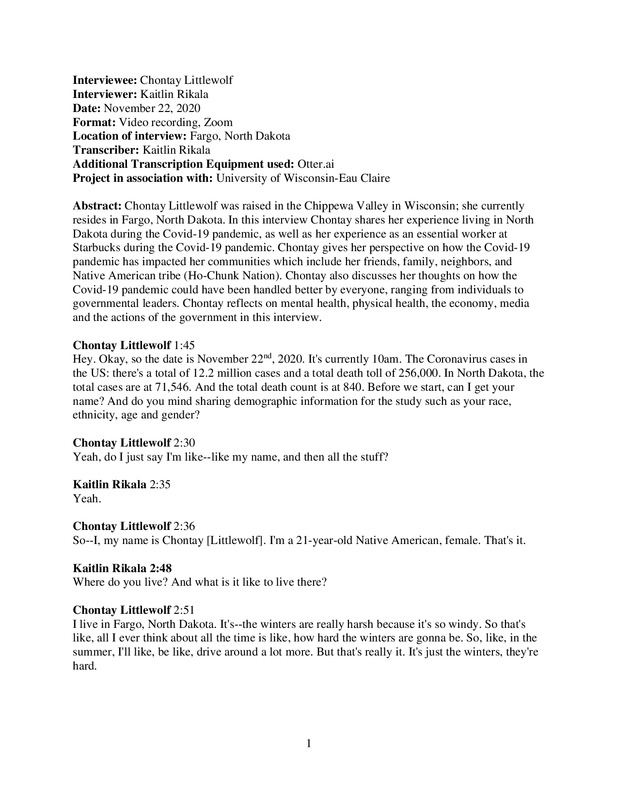 12/09/2020
12/09/2020Chontay Littlewolf Oral History, 2020/11/22
Chontay Littlewolf was raised in the Chippewa Valley in Wisconsin; she currently resides in Fargo, North Dakota. In this interview Chontay shares her experience living in North Dakota during the Covid-19 pandemic, as well as her experience as an essential worker at Starbucks during the Covid-19 pandemic. Chontay gives her perspective on how the Covid-19 pandemic has impacted her communities which include her friends, family, neighbors, and Native American tribe (Ho-Chunk Nation). Chontay also discusses her thoughts on how the Covid-19 pandemic could have been handled better by everyone, ranging from individuals to governmental leaders. Chontay reflects on mental health, physical health, the economy, media and the actions of the government in this interview. -
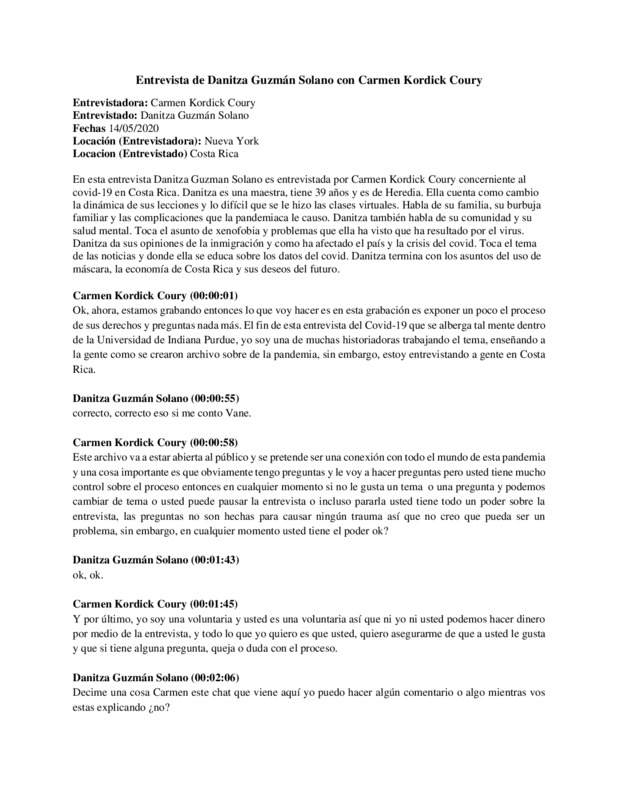 05/14/2020
05/14/2020Danitza Guzman Solano Oral History, 2020/05/14
En esta entrevista Danitza Guzman Solano es entrevistada por Carmen Kordick Coury concerniente al covid-19 en Costa Rica. Danitza es una maestra, tiene 39 años y es de Heredia. Ella cuenta como cambio la dinámica de sus lecciones y lo difícil que se le hizo las clases virtuales. Habla de su familia, su burbuja familiar y las complicaciones que la pandemiaca le causo. Danitza también habla de su comunidad y su salud mental. Toca el asunto de xenofobia y problemas que ella ha visto que ha resultado por el virus. Danitza da sus opiniones de la inmigración y como ha afectado el país y la crisis del covid. Toca el tema de las noticias y donde ella se educa sobre los datos del covid. Danitza termina con los asuntos del uso de máscara, la economía de Costa Rica y sus deseos del futuro. -
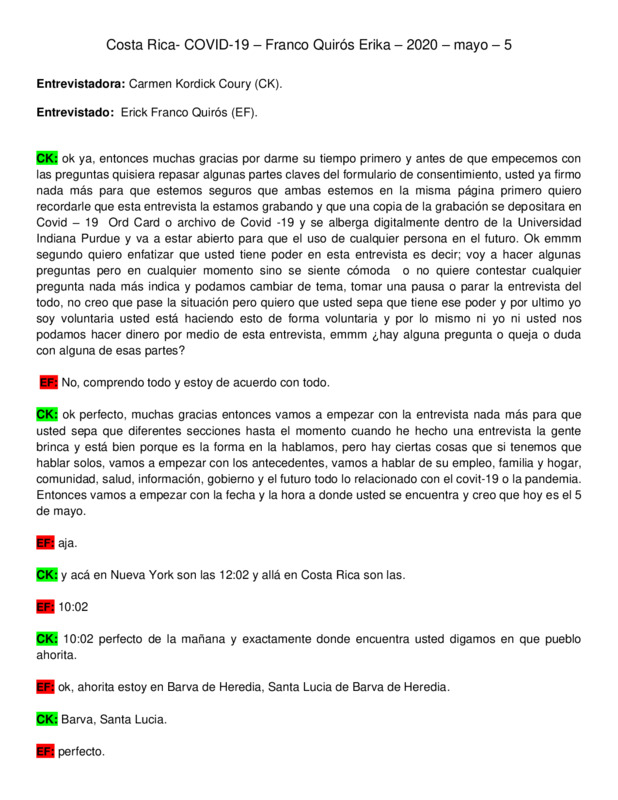 05/05/2020
05/05/2020Erika Franco Quirós Oral History, 2020/05/05
En esta entrevista Erika Franco Quirós es entrevistada por Carmen Kordick Coury concerniente al covid-19 en Costa Rica. Erika es una orientadora en el Colegio Técnico Profesional. Ella tiene 42 años, vivia sola antes de la pandemia pero decidio moverse a Heredia para estar con su mama y hermanos. Hablan del momento en que Erika se dio cuenta de la pandemia por primera vez, de su trabajo y como le va en el teletrabajo en el colegio y de sus estudiantes. Habla de su familia y sus amigos, de la religión y la espiritualidad, y de la misa por television. Erika habla de como se siente pagando su propio teléfono y internet para poder comunicarse con sus estudiantes, habla del gobierno y la corrupción. Habla un poco de las fuentes de informacion donde ella recibe información y tambien de las noticias falsas. Tocan el tema de la violencia domestica. Termina hablando del futuro. -
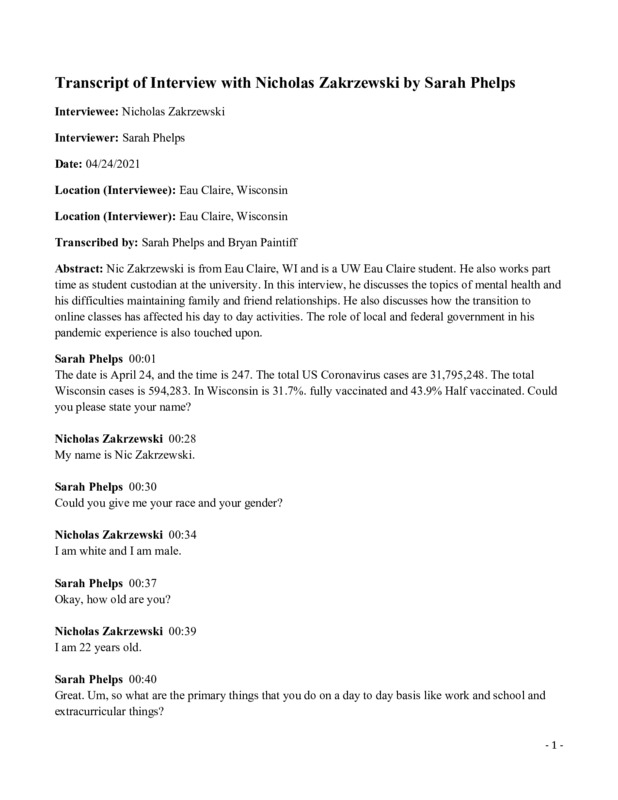 04/24/2021
04/24/2021Zakrzewski Nic, Oral History, 2021/04/24
Nic Zakrzewski is from Eau Claire, WI and is a UW Eau Claire student. He also works part time as student custodian at the university. In this interview, he discusses the topics of mental health and his difficulties maintaining family and friend relationships. He also discusses how the transition to online classes has affected his day to day activities. The role of local and federal government in his pandemic experience is also touched upon. -
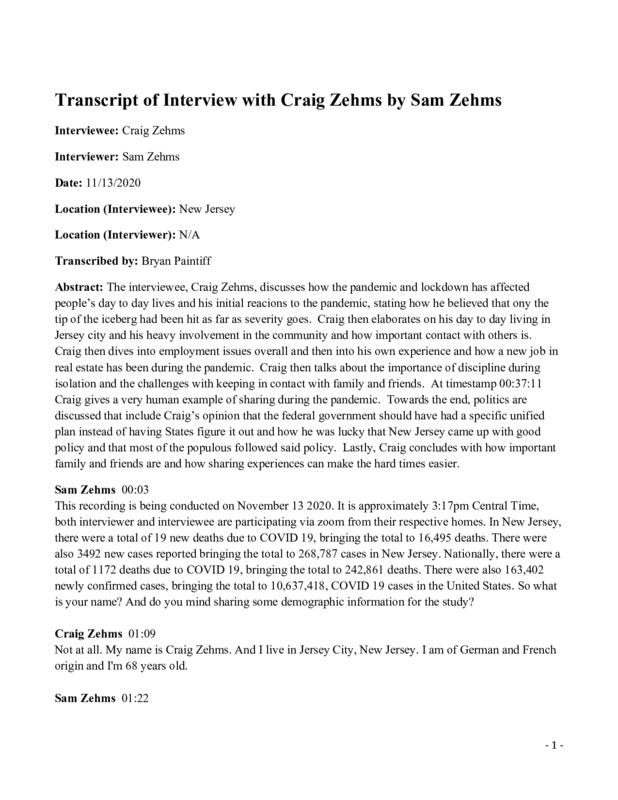 11/13/2020
11/13/2020Craig Zehms Oral History, 2020/11/13
The interviewee, Craig Zehms, discusses how the pandemic and lockdown has affected people’s day to day lives and his initial reacions to the pandemic, stating how he believed that ony the tip of the iceberg had been hit as far as severity goes. Craig then elaborates on his day to day living in Jersey city and his heavy involvement in the community and how important contact with others is. Craig then dives into employment issues overall and then into his own experience and how a new job in real estate has been during the pandemic. Craig then talks about the importance of discipline during isolation and the challenges with keeping in contact with family and friends. At timestamp 00:37:11 Craig gives a very human example of sharing during the pandemic. Towards the end, politics are discussed that include Craig’s opinion that the federal government should have had a specific unified plan instead of having States figure it out and how he was lucky that New Jersey came up with good policy and that most of the populous followed said policy. Lastly, Craig concludes with how important family and friends are and how sharing experiences can make the hard times easier. -
2020-03-30
Having to wear masks
The news article I put is an article about having to wear masks through the pandemic. This was a big change for America with many people wearing masks to help slow the spread and keep ourselves and those around us safe from covid. Many states had laws on when to wear masks, this was a historic moment for America when they announced we had to wear masks because the covid illness is very serious. -
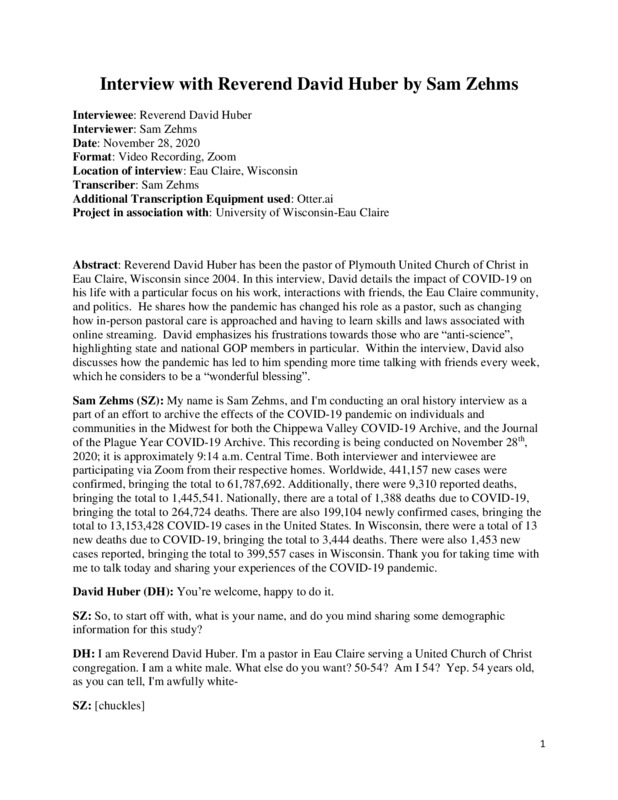 12/15/2020
12/15/2020David Huber Oral History, 2020/12/15
C19OH -
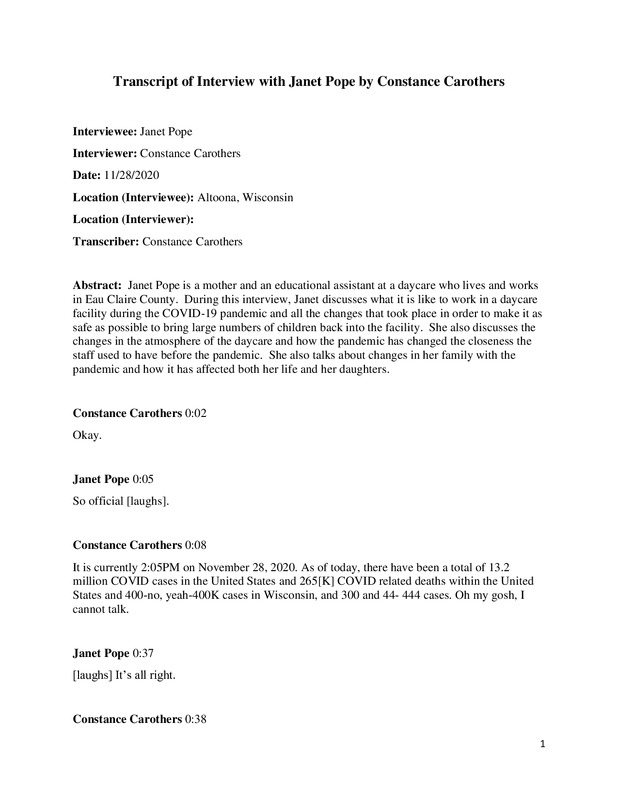 12/11/2020
12/11/2020Janet Pope Oral History, 2020/12/11
C19OH -
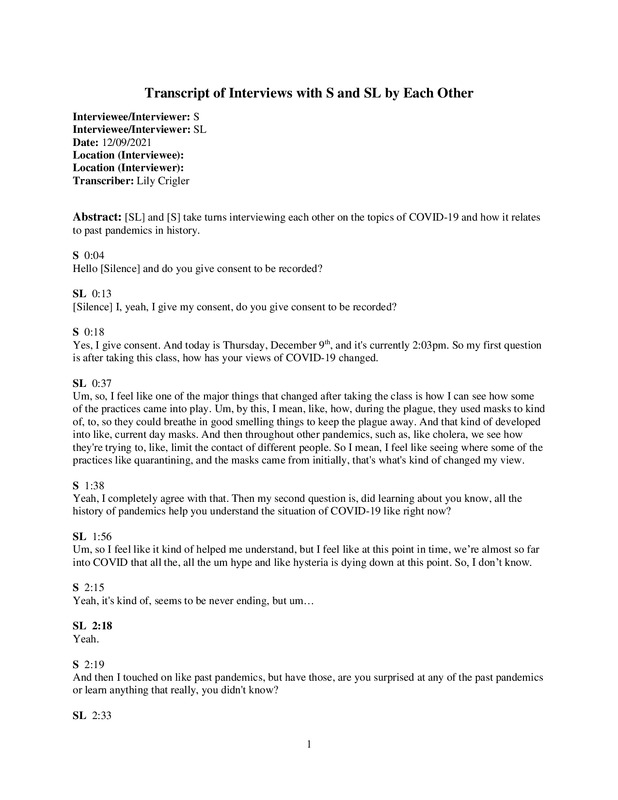 12/09/2021
12/09/2021SL and S Oral History, 2021/12/09
[SL] and [S] (Last name unknown) take turns interviewing each other on the topics of covid-19 and how it relates to past pandemics in history. -
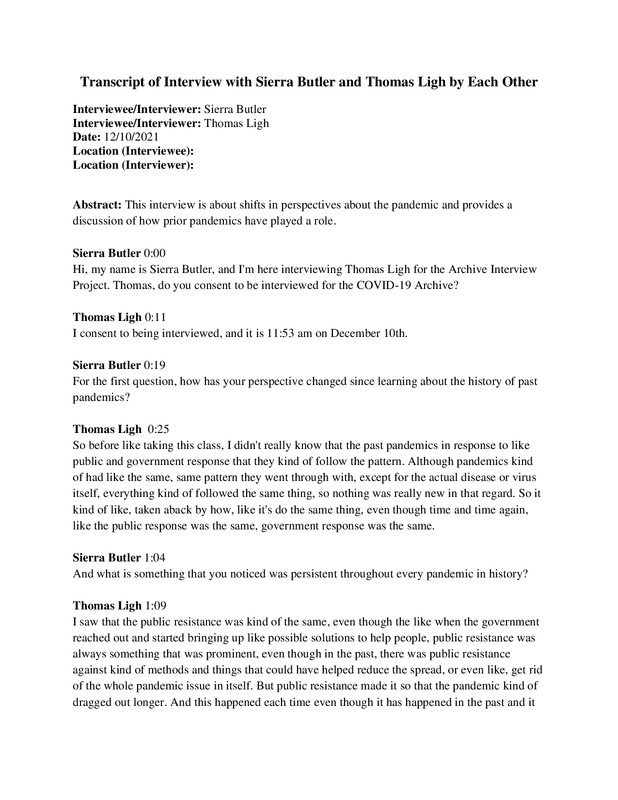 2021-12-10T11:53
2021-12-10T11:53Thomas Ligh and Sierra Butler, Oral History, 2021/12/10
In this interview we discussed what we learned in our History of Global Pandemics class and how that has affected our perspective of pandemics, including COVID-19. -
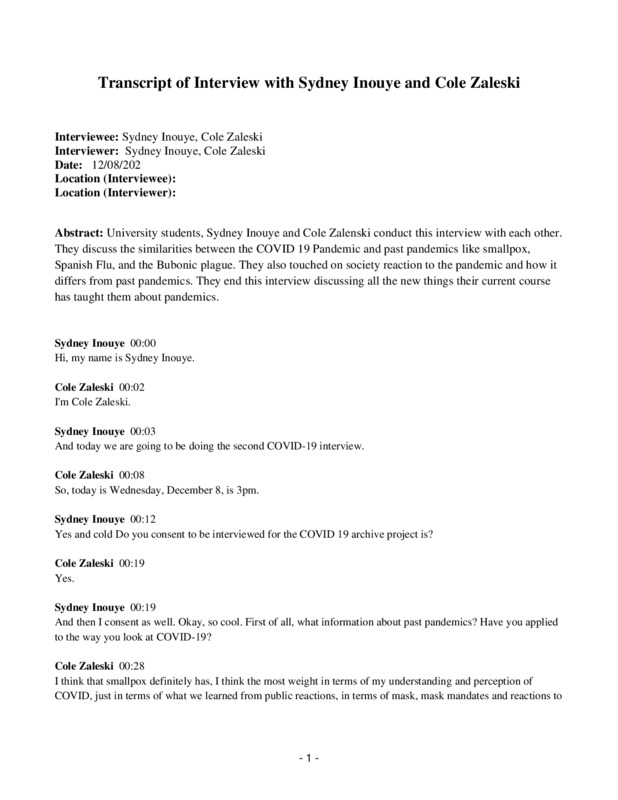 2021-12-08
2021-12-08Sydney Inouye, Cole Zaleski Oral History, 2021/12/08
We are discussing the comparisons between COVID-19 and previous pandemics, as well as how the pandemic has impacted our first year of college. -
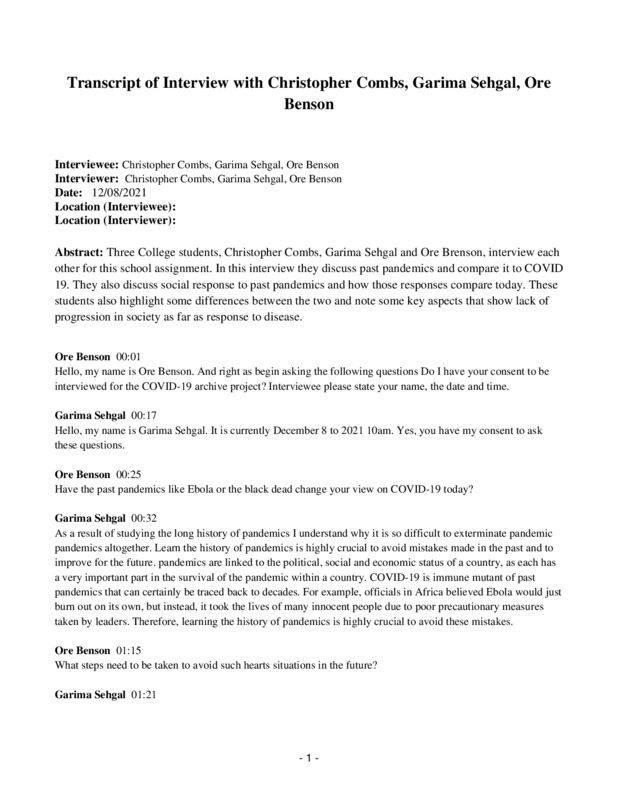 2021-12-08
2021-12-08Christopher Combs, Garima Sehgal, Ore Benson Oral History, 2021/12/08
This podcast covers the ways that learning about past pandemics has affected our attitude toward, or perception of, the current pandemic. -
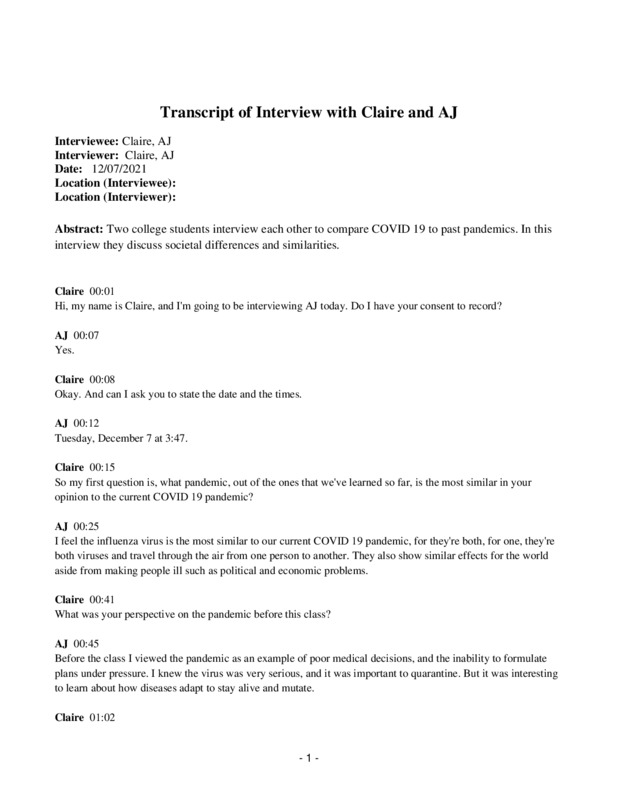 2021-12-07
2021-12-07Claire and AJ Oral History, 2021/12/07
We took a class about global pandemics, and we are explaining how our perspectives on pandemics have changed. -
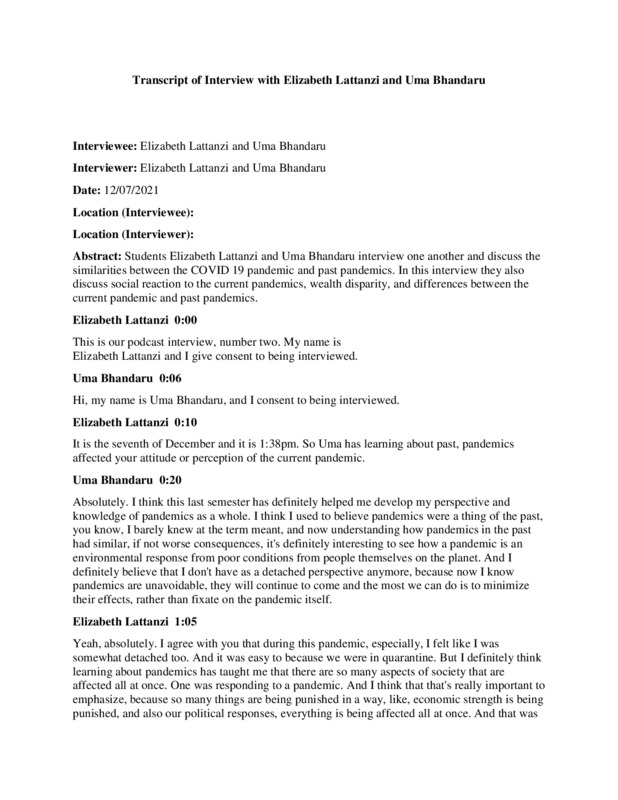 2021-12-07T13
2021-12-07T13Covid-19 Archive Project Second Interview
After learning about four major pandemics, we discussed how our views of the COVID-19 pandemic have changed over the course of the semester, and how our perceptions of pandemics as a whole have changed. -
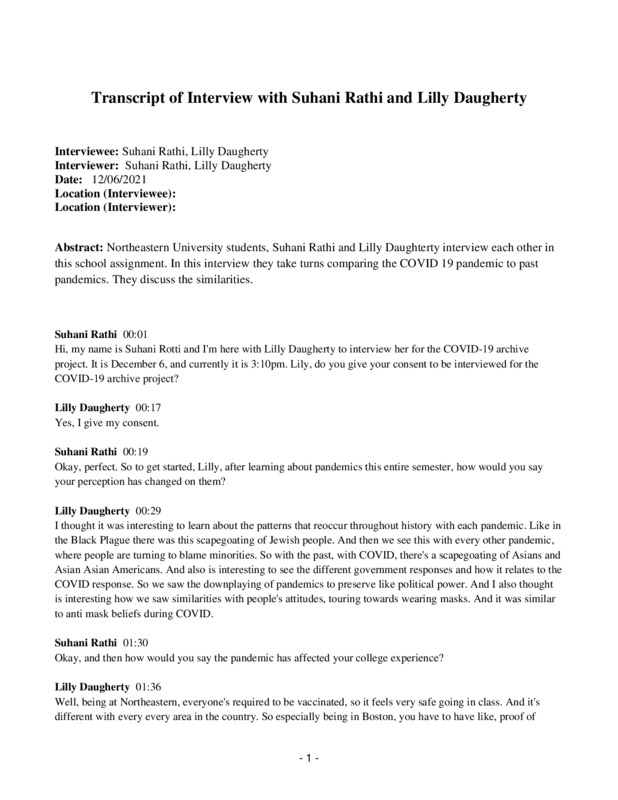 2021-12-06
2021-12-06Suhani Rathi and Lilly Daugherty Oral History, 2021/12/06
Northeastern University students, Suhani Rathi and Lilly Daughterty interview each other in this school assignment. In this interview they take turns comparing the COVID 19 pandemic to past pandemics. They discuss the similarities. -
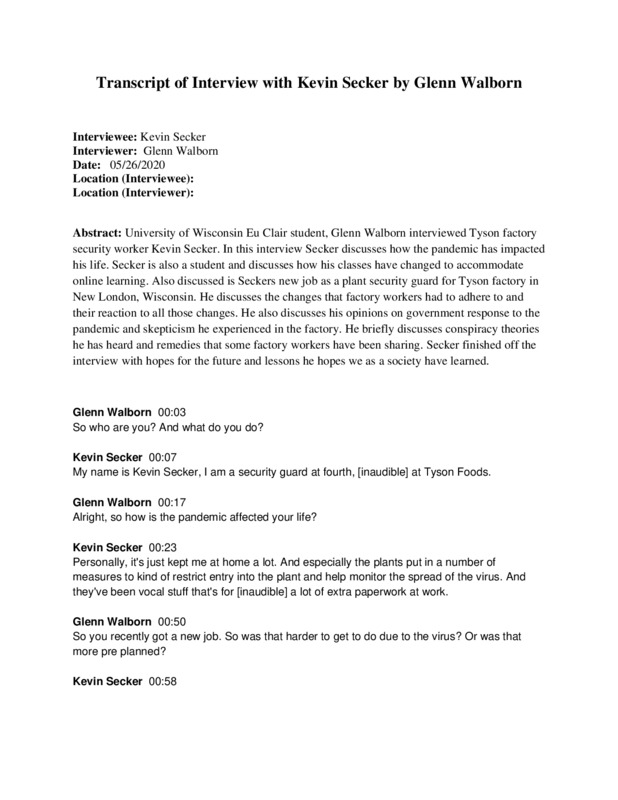 05/16/2020
05/16/2020Kevin Secker Oral History, 2020/05/16
University of Wisconsin Eu Clair student, Glenn Walborn interviewed Tyson factory security worker Kevin Secker. In this interview Secker discusses how the pandemic has impacted his life. Secker is also a student and discusses how his classes have changed to accommodate online learning. Also discussed is Seckers new job as a plant security guard for Tyson factory in New London, Wisconsin. He discusses the changes that factory workers had to adhere to and their reaction to all those changes. He also discusses his opinions on government response to the pandemic and skepticism he experienced in the factory. He briefly discusses conspiracy theories he has heard and remedies that some factory workers have been sharing. Secker finished off the interview with hopes for the future and lessons he hopes we as a society have learned. -
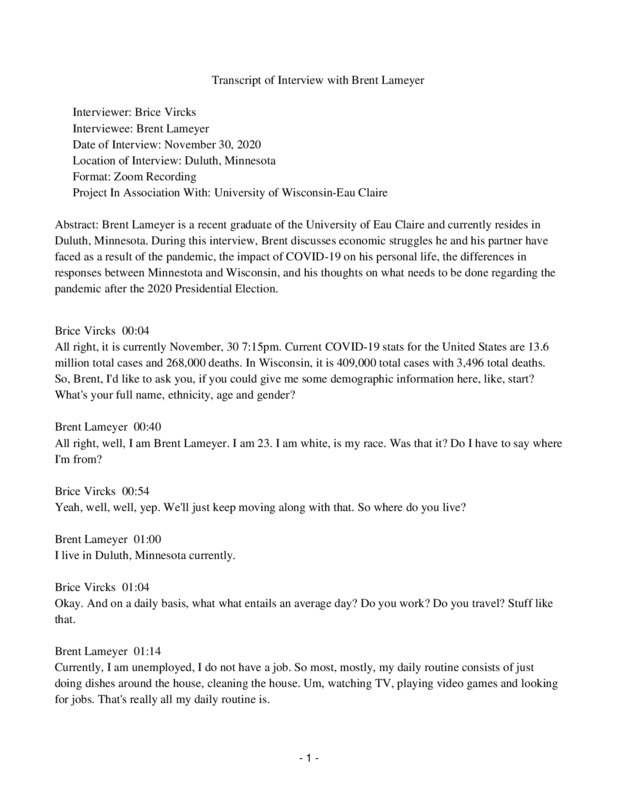 11/30/2020
11/30/2020Brent Lameyer Oral History, 2020/11/30
C19OH -
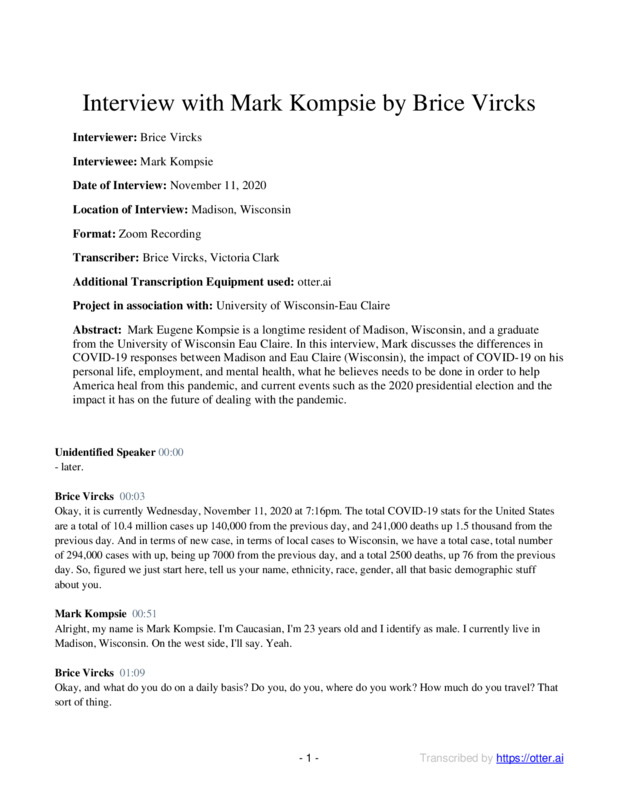 12/08/2020
12/08/2020Mark Kompsie Oral History, 2020/12/08
C19OH -
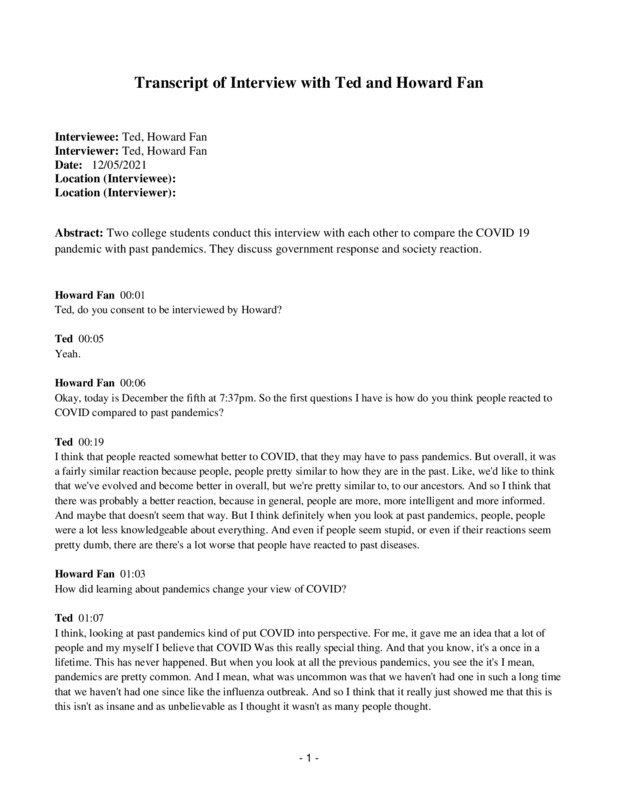 2021-12-05
2021-12-05Ted and Howard Fan Oral History, 2021/12/05
Two college students conduct this interview with each other to compare the COVID 19 pandemic with past pandemics. They discuss government response and society reaction. -
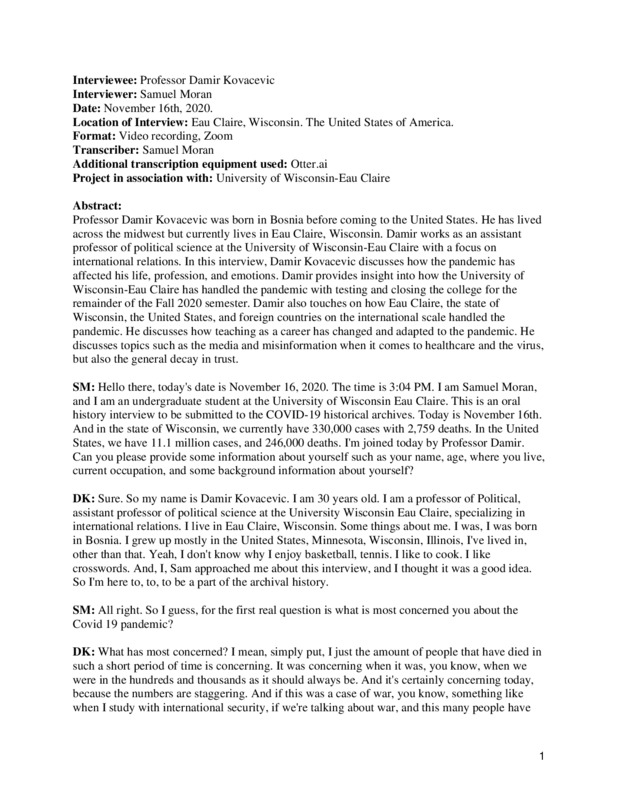 12/11/2020
12/11/2020Damir Kovacevic Oral History, 2020/11/16
Professor Damir Kovacevic was born in Bosnia before coming to the United States. He has lived across the midwest but currently lives in Eau Claire, Wisconsin. Damir works as an assistant professor of political science at the University of Wisconsin-Eau Claire with a focus on international relations. In this interview, Damir Kovacevic discusses how the pandemic has affected his life, profession, and emotions. Damir provides insight into how the University of Wisconsin-Eau Claire has handled the pandemic with testing and closing the college for the remainder of the Fall 2020 semester. Damir also touches on how Eau Claire, the state of Wisconsin, the United States, and foreign countries on the international scale handled the pandemic. He discusses how teaching as a career has changed and adapted to the pandemic. He discusses topics such as the media and misinformation when it comes to healthcare and the virus, but also the general decay in trust.
